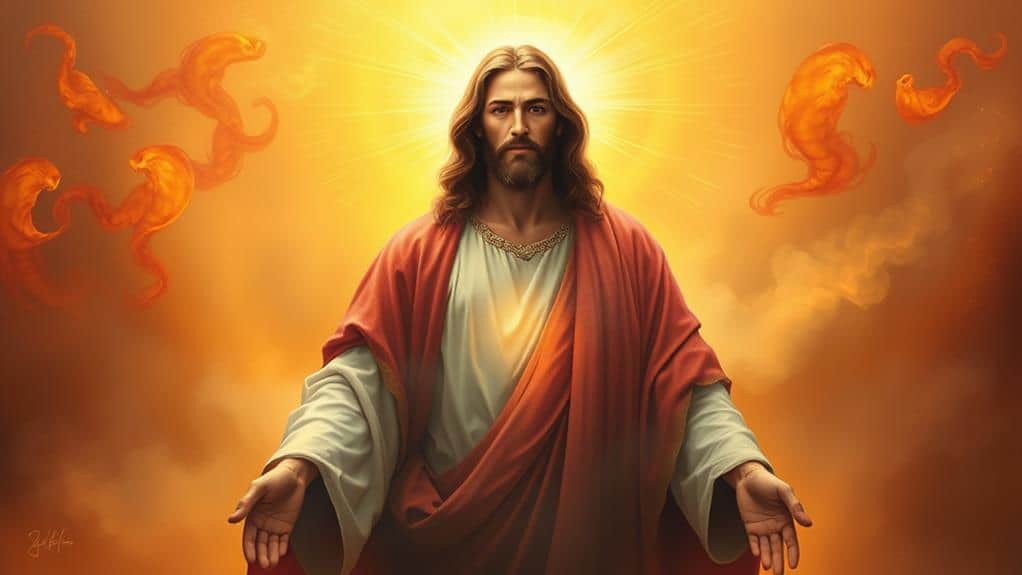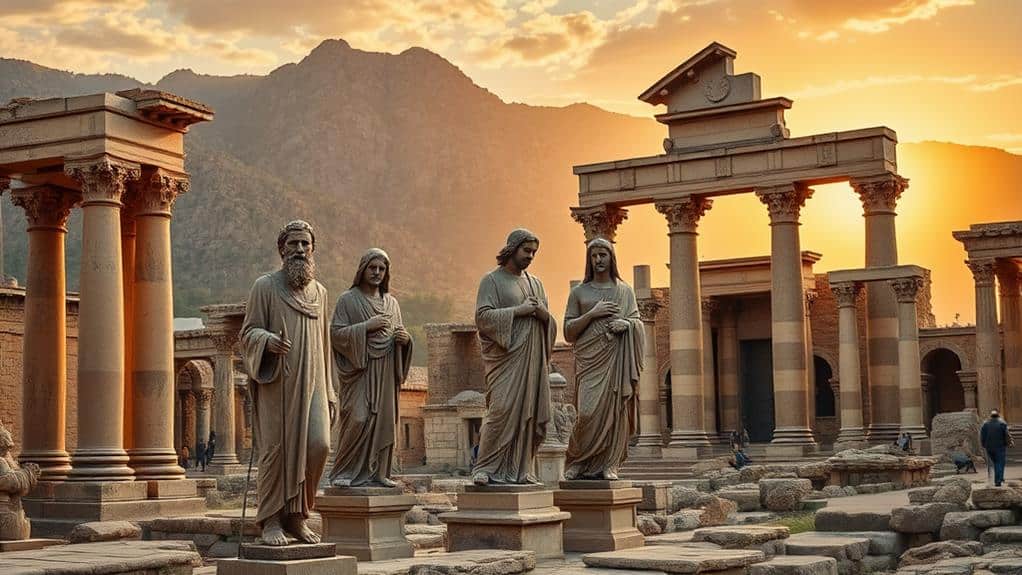Samuel's death marked the end of an era, but his legacy as a champion of faith, obedience, and humility endures. As Israel's last judge and first prophet, he guided the nation through its shift to monarchy, anointing Saul and David as its first kings. Samuel's leadership amidst change exemplified adaptability and faithfulness to God, emphasizing the importance of obedience in leadership. His prophetic insights shaped Israel's destiny, and his mentorship profoundly influenced King David's leadership style. As we explore Samuel's life and ministry, we begin to uncover the profound impact of his enduring legacy on leaders and believers alike.
Key Takeaways
- Samuel's humble departure emphasized simplicity and humility, reflecting his understanding of authority as rooted in God, not individuals.
- His legacy characterized by resilience amidst monarchy's complexities, continued to shape Israel's spiritual landscape beyond his roles as judge and priest.
- Samuel's teachings and mentorship empowered Israel to navigate transitions with faith and guidance, leaving a lasting impact on leaders and the nation.
- His life and leadership style, marked by faithfulness and obedience to God, served as a model for future leaders navigating societal changes.
- Samuel's enduring legacy inspires ongoing spiritual growth, offering insights into faith, leadership, and resilience that continue to guide and influence generations.
Samuel's Life and Ministry
In the midst of Israel's shift from a theocratic to a monarchical system, Samuel stood at the forefront, serving as a prophet, priest, and judge – a trifecta of roles that underscored his divine calling and dedication to God's service.
Guided by Samuel's prophetic vision, Israel navigated this pivotal change, and his spiritual integrity provided a steady anchor amidst the flux.
As a prophet, Samuel received direct revelation from God, illuminating his understanding of Israel's future. His priestly role facilitated worship and sacrifice, while his judgeship guaranteed justice and order.
Through these interconnected roles, Samuel embodied the essence of Israel's covenant with God, exemplifying faithfulness and obedience. His prophetic vision and spiritual integrity formed the foundation of his ministry, shaping Israel's spiritual and political landscape.
Transition to Monarchy in Israel
Samuel's prophetic vision marked a significant turning point in Israel's history, as the nation shifted from a theocratic system to a monarchical one. This change was a direct result of Samuel's prophetic authority, which guided the Israelites in their desire for a king.
The political transformation wasn't without its challenges, as Samuel had to navigate the complexities of establishing a new system of governance. Despite these challenges, Samuel's leadership and prophetic guidance guaranteed a relatively smooth change, laying the groundwork for the monarchy's future success.
As a result, Samuel's legacy extends beyond his own lifetime, shaping the course of Israel's history and cementing his place as a pivotal figure in the nation's development. His prophetic authority remained a vital element in the monarchy's establishment.
Anointing of Saul and David
Through his prophetic office, Samuel anoints Saul and David as Israel's first two kings, setting in motion the nation's shift from a theocratic to a monarchical system.
The anointing significance is multifaceted, marking a pivotal moment in Israel's history. By anointing Saul, Samuel exercises his prophetic authority, signifying God's sovereignty over the newly established monarchy.
However, Saul's failure to obey God's commands leads to his rejection, and Samuel subsequently anoints David, who'd become Israel's greatest king.
This transfer of power underscores the weight of prophetic authority, highlighting Samuel's essential role in shaping Israel's destiny.
As a prophet, Samuel's anointing of David guarantees the continuation of God's covenant with Israel, solidifying the nation's future under monarchical rule.
Leadership Amidst Change
As the prophetic anointing of Saul and David sets the stage for a new era in Israel's history, the nation's shift from a theocratic to a monarchical system necessitates effective leadership amidst unprecedented change.
Samuel's leadership qualities, honed through his experiences as a prophet, priest, and judge, provide a model for steering this societal transformation. His ability to adapt to changing circumstances while remaining faithful to God's will is a hallmark of his leadership.
As Israel evolves to a monarchical system, Samuel's legacy serves as a reminder that effective leadership must be grounded in obedience to God's word.
Samuel's Final Days and Guidance
In the twilight of his years, Samuel continued to provide critical guidance to Israel's leaders, underscoring the importance of obedience to God's will.
His final guidance emphasized the need for leaders to prioritize God's commands over personal interests.
Samuel's prophetic insights played an essential role in shaping the nation's destiny, as he counseled kings and leaders to seek God's wisdom.
Through his guidance, Samuel demonstrated that true leadership involves surrendering to God's sovereignty.
His unwavering commitment to God's will left an indelible mark on Israel's leaders, encouraging them to trust in God's providence.
As Samuel's life drew to a close, his guidance remained a beacon of hope, illuminating the path forward for Israel's leaders and reinforcing the importance of faithfulness to God's covenant.
Impact on King David's Life
Samuel's guidance had a profound impact on King David's life, shaping his understanding of leadership and faithfulness to God.
As David navigated the complexities of ruling Israel, Samuel's wisdom played an essential role in his decision-making process.
With Samuel's guidance, David learned to prioritize his relationship with God and trust in His sovereignty.
- Samuel's mentorship helped David understand the importance of obedience to God's commands.
- David's leadership was marked by a commitment to justice and righteousness, reflecting Samuel's influence.
- Samuel's wisdom taught David to seek God's counsel in times of uncertainty.
- David's reliance on God's guidance was a direct result of Samuel's emphasis on faithfulness.
- Through Samuel's guidance, David became a leader who prioritized his relationship with God, leading to a prosperous and just reign.
A New Era for Israel
With the passing of Samuel, a monumental shift takes place in Israel's history, marking the end of an era and the beginning of a new one under the leadership of King David.
Samuel's prophetic calling had been instrumental in establishing the Israelite monarchy, and his spiritual leadership had guided the nation through a period of significant change.
As David assumes the throne, he builds upon the foundation laid by Samuel, seeking to establish a kingdom that honors God.
The era of the judges gives way to the era of the kings, and Israel's history is forever altered.
Samuel's legacy continues to shape the nation's destiny, as his commitment to faithfulness and obedience to God serves as a model for future leaders.
Reflections on Samuel's Departure
As the era of the judges drew to a close, the departure of Samuel marked a poignant moment in Israel's history. His passing, though simple and unassuming, left an indelible mark on the nation.
Samuel's spiritual humility and prophetic influence had shaped Israel's destiny, and his legacy continued to inspire future generations.
- His life and teachings emphasized the importance of faith and obedience to God.
- Samuel's prophetic influence extended beyond his lifetime, shaping the course of Israel's history.
- His humility and devotion served as a model for future leaders.
- The brevity of his death account in 1 Samuel 25:1 belies the profound impact he'd on the nation.
- Samuel's departure marked the beginning of a new era in Israel, one in which the monarchy would play a central role.
Comparing Samuel to Moses
One notable aspect of Samuel's life is the striking contrast between his departure and that of Moses, another iconic leader in Israel's history.
Moses' grand exit, as described in Deuteronomy 34, features a dramatic farewell address, underscored by divine validation of his leadership. Conversely, Samuel's humble departure is marked by simplicity, with a subtle mention in 1 Samuel 25:1.
This contrast highlights Samuel's humility, demonstrating a deep understanding that the true authority lies not with the individual, but with God. Alternatively, Moses' leadership was often publicly authenticated, reflecting the complexities of leading a newly formed nation.
Samuel's Lasting Spiritual Impact
Samuel's understated departure belies the profound spiritual impact he'd on the nation of Israel, an influence that persists long after his passing. His legacy is characterized by spiritual resilience, which empowered the people of Israel to navigate the complexities of the monarchy's establishment.
Samuel's prophetic influence extends beyond his role as a judge and priest, as his teachings and mentorship continue to shape the spiritual landscape of Israel.
- *Samuel's emphasis on faith and obedience over ritual sacrifices* (1 Samuel 15:22) serves as a guiding principle for spiritual growth and development.
- *His role in establishing the monarchy* marks the beginning of a new era in Israel's history, characterized by a deepening understanding of God's sovereignty.
- *The impact of Samuel's mentorship* is evident in David's grief, highlighting the significance of intergenerational leadership and discipleship.
- *Samuel's humble departure* serves as a model for leaders, emphasizing the importance of humility and devotion in service to God.
- *His enduring legacy* continues to inspire believers, offering insights into the intersection of faith, leadership, and spiritual resilience.
Lessons From Samuel's Legacy
Through the lens of Samuel's life and legacy, valuable lessons emerge for leaders and believers seeking to navigate the complexities of faith, leadership, and spiritual resilience.
Samuel's exemplary spiritual mentorship, as seen in his guidance of David and Saul, highlights the importance of investing in the spiritual growth of others. His prophetic legacy serves as a model for leaders, emphasizing the need for faithfulness, obedience, and dependence on God.
Furthermore, Samuel's commitment to speaking truth to power, even in the face of adversity, demonstrates the significance of courage and conviction in leadership.
As believers reflect on Samuel's life and legacy, they're reminded of the enduring impact of spiritual mentorship and the prophetic call to stand firm in their faith, even in the midst of challenge and change.
Frequently Asked Questions
What Biblical Book Contains the Account of Samuel's Life and Death?
The book of 1 Samuel contains the account of Samuel's life and death, highlighting his prophetic calling and lineage as a priest, judge, and leader who anointed Israel's first two kings, Saul and David.
Who Succeeded Samuel as the Spiritual Leader of Israel After His Death?
After Samuel's death, no single individual succeeded him as the spiritual leader of Israel. Instead, the spiritual succession shifted to the prophets and priests appointed by the monarchy, marking a significant leadership change in Israel's history.
What Is the Significance of Samuel's Death in Relation to David's Kingship?
Samuel's death signifies a pivotal moment in David's kingship, as it follows David's anointing and marks a prophetic change, enabling David to assume full leadership and cement his position as Israel's second king, fulfilling God's plan.
How Did Samuel's Legacy Influence the Prophetic Movement in Israel?
Samuel's legacy profoundly influenced the prophetic movement in Israel, establishing a new paradigm of prophetic authority that emphasized spiritual mentorship, accountability, and obedience to God, shaping the nation's spiritual trajectory for generations to come.
What Lessons Can Modern-Day Leaders Learn From Samuel's Leadership Style?
Modern-day leaders can learn from Samuel's leadership style by embracing servant leadership, upholding moral integrity, developing emotional intelligence, providing visionary guidance, mastering conflict resolution, and fostering community engagement, as exemplified in his life and ministry.
Conclusion
Samuel's legacy endures long after his death, shaping Israel's destiny and inspiring future generations. His unwavering dedication to God's service remains a powerful example for leaders and individuals seeking to live in harmony with their faith. As a prophet, priest, and judge, Samuel's life and teachings emphasize the importance of faith, obedience, and leadership in times of change. His impact continues to guide believers, offering valuable lessons for those seeking to follow in his footsteps.






